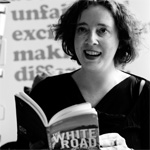You have no items in your cart. Want to get some nice things?
Go shopping
In the first in a new monthly series, “A Flash of Inspiration”, we talk to Tania Hershman about her story “Think Of Icebergs“
What we love about “Think Of Icebergs”
One of the things I like most about “Think Of Icebergs” is the immediacy of the opening. It drops the reader straight into the action and introduces a big theme in a very clever and subtle way. In the space of just eight lines we learn everything about the world the characters inhabit and how they feel about it.
The dialogue is minimalist but also slightly wistful which provides a sense of foreboding, the flippant remark at the end standing in stark contrast to the gesture of the narrator as he places his arm upon his companion’s “bony shoulder.”
The sparseness of that opening is very striking because it explains so much with so little. The fact that those shoulders are “bony” is no accident. It signifies we are in a world where things have gone wrong, where people go hungry. Become “bony.” It’s apocalyptic. But there is no melodrama, no explanation beyond that word. It’s a great example of control and precision and beautifully demonstrates the deceptive simplicity of flash fiction.
Having set the reader up so carefully the second half of the story then provides us with a strange and unsettling contrast.
The cool refuge of the Grand Hotel is clearly populated by people fortunate enough to be able to escape the “hell” of the world beyond its air-conditioned walls and we can feel their other-worldliness through the descriptions of them – the “high hairdos” and the “heavy suits” – they are at once comical and menacing, and clearly set apart from the thin-limbed central characters.
Yet, although the rarefied world of the Grand provides some respite we nevertheless can’t help but be troubled by it. The privileged guests swoop confidently through the lobby and float gracefully into the lifts, but are they even aware of the main characters? Do they even register the oppressive heat outside? Or are they so cocooned physically and psychologically that they are incapable of acknowledging anything beyond their hotel paradise?
Perhaps it is even this psychological blindness that has helped bring about the catastrophe that is unfolding around them? But the “frying pan” heat and the “melting pavements” surely cannot escape their attention for much longer?
All of this happens within eight short paragraphs but all the questions and assumptions all the imagining must come from the reader. But it’s possible because there is space there, within the story, for the reader to insert themselves.
It’s so well done you can almost feel yourself settling into one of the hotel lobby chairs as you sip iced-coffee and observe the world around you and ponder its fate.
“Think Of Icebergs” is a master class in understatement and a great piece of flash fiction.
Tania on writing “Think Of Icebergs”
 Jen: Can you tell us a little about the way you crafted “Think Of Icebergs”? There are so many themes and ideas tucked away inside I was curious as to whether you stared with a longer version which you then pared back or whether you distilled the ideas first before sitting down to write it.
Jen: Can you tell us a little about the way you crafted “Think Of Icebergs”? There are so many themes and ideas tucked away inside I was curious as to whether you stared with a longer version which you then pared back or whether you distilled the ideas first before sitting down to write it.
Tania: I never start with something longer, I think that 500 words or so is my natural length. As far as I remember, this – as with almost all of the flash stories in my 2nd collection – was written using prompts, a set of phrases chosen by a writing friend. I love this way of writing, you take 5 or 6 such phrases, then try and use them all, in any order, in your story – plugging another one in when you get stuck to keep you writing. It’s best if someone else picks the prompts and you have a very short time to write in.
It works for me, very well. I am also pretty sure I wrote this for a competition on the theme of climate change, so that was in the back of my mind. I can’t quite remember. I didn’t win the competition, but was delighted when Litro chose it for their Climate issue!
So I try not to think about anything while I am writing and generally have no idea what is going to come out, and sometimes I don’t know afterwards what it is I have written about. Which I am fine with, it’s a privilege to have readers or listeners who will tell me what they think the story is about. I love that. It took me years and years of practice to get to this point, but when I write fiction I have no inhibitions at all, no Inner Critic telling me I “can’t” write about certain things, or in a certain way. I suspect that writing very fast helps. I can get a first draft down before my Picky Editor wakes up and starts to say “Wait, hang on, wha…?”
Jen: Why did you choose to open the story with dialogue?
Tania: To follow on from the above, I didn’t consciously choose to do anything, this is how the story came out. For me, fiction starts with voice, with character, and this story started with this voice. The opening line told me a lot – that there were two people, talking to each other. I love using “I” and “You”, I have a lot of stories written in these voices, I learned it from reading Ali Smith’s short stories. To me it feels incredibly intimate, like we, the readers, are standing in that tiny space between two people. So, I started with dialogue because that’s what I heard first and that was my way in to finding out what was going to happen in this story.
Jen: The imagery in this piece is very vivid – those businessmen swooping like birds and the pampered old ladies with their little dogs – I was immediately transported into the world of the Grand Hotel. How do you come up with such imagery? It’s slightly poetic.
Tania: I remembered while thinking about these questions that I had a specific hotel in mind, the Hilton Hotel in Tel Aviv! I used to live in Israel, and as a technology journalist went to quite a few conferences at the Hilton. Obviously, it being the Middle East, it was often extremely hot outside, but the minute I stepped into the hotel lobby, the world changed, the climate altered. I love sitting in hotel lobbies and watching people pass by.
As to the slightly poetic -thank you! Something I’ve understood now that I am writing things I do actually call poems is that flash fiction, for me, has been the gateway, the “safe passage”, towards poetry. I was frightened by poetry, by line breaks, by the weight attached to the form in general, so flash fiction, these tiny, compressed word-blocks, allowed me to sneak towards poetry, to get a little “poetic” without committing!
Now that I am writing poems, I see how it is a completely different process, for me anyway. These flash stories are flash stories, not poems without line breaks. Each has different needs, and different aims. I am enjoying writing poems because I can get away with less narrative, if I want to, and because I can use the shape of the words on the page to do something more.
Jen: The two central characters are very vulnerable given the world they inhabit, but I found them hopeful. There is a sense that their humanity, the very fact that they care for one another, would help them through their adversity and may even signal that all is not lost. Were you aware of this? This hope within the darkness?
Tania: I am so glad you said this because I do worry that most of my writing is very, very dark, but I like to think of it as tragically hopeful, or hopefully tragic – with a touch of humour. Or, at least, not coming down definitely on one side or the other, but leaving the story open enough. This, for me, is what life is about – trying to find connections to others that help you deal with uncertainty, which is all we can really be sure about: we have very little idea what will happen next.
Jen: Finally, we’ve had our say about “Think Of Icebergs”, but what do you like about it?
Tania: Ooh, there’s an interesting question. I like them, I always feel affection for my characters, even if their stories are very short and I never hang out with them again. I like their relationship, their sense of humour, their embrace of the nonsensical, the way they understand without one saying “What do you mean by…?” I guess in some ways that’s the ideal, a partner who gets you wholly, and who makes sure there’s always iced coffee when you’re hot. I also like that I touched on some kind of climate-related issue without trying too hard, that things are hinted at.
I also like that I wrote myself a story which, four years later, conjures up a specific hotel lobby: I can feel that fierce air con, see those businessmen. I’m so happy to be a writer, for what it does for me, how it helps me shape the way I see the world, get it down on paper. It’s constantly a miracle if it speaks to someone else, anyone else. Thank you for choosing this story, and for asking me about it – the final thing I like about this story is that it got me here, talking to you! What a joy.
What do you think of “Think of Icebergs“? Why not take a read and let us know!





